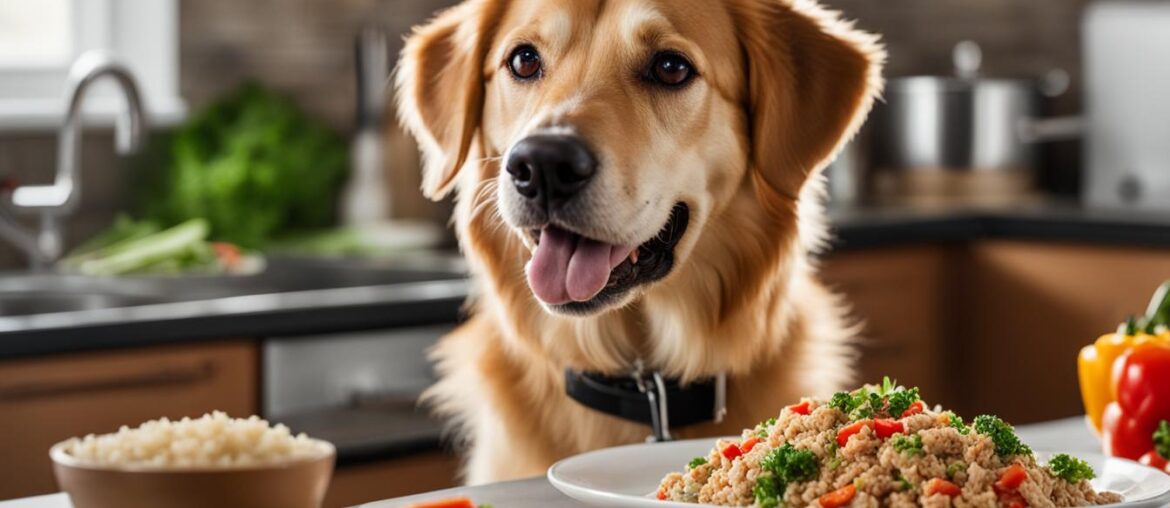As a responsible pet owner, it’s natural to want the best for your furry friend, including their diet. When it comes to feeding dogs, there are various options, and one that often comes up is ground turkey. But is ground turkey safe and beneficial for dogs? Let’s delve into the topic and explore the insights provided by veterinarians.
Ground turkey, when prepared and served correctly, can be a healthy addition to a dog’s diet. It is a lean source of protein that provides essential nutrients for dogs, promoting muscle growth and repair. However, it’s crucial to follow specific guidelines to ensure the safety and well-being of your canine companion.
Key Takeaways:
- Ground turkey, when prepared properly, can be a healthy addition to a dog’s diet.
- It is a lean protein source that provides essential nutrients for dogs.
- Follow guidelines to ensure the safety of your dog when feeding them ground turkey.
- Don’t add harmful ingredients to the ground turkey, and consult a veterinarian for personalized dietary recommendations.
- Ground turkey should make up no more than 10% of a dog’s daily caloric intake.
Is Turkey Bad for Dogs?
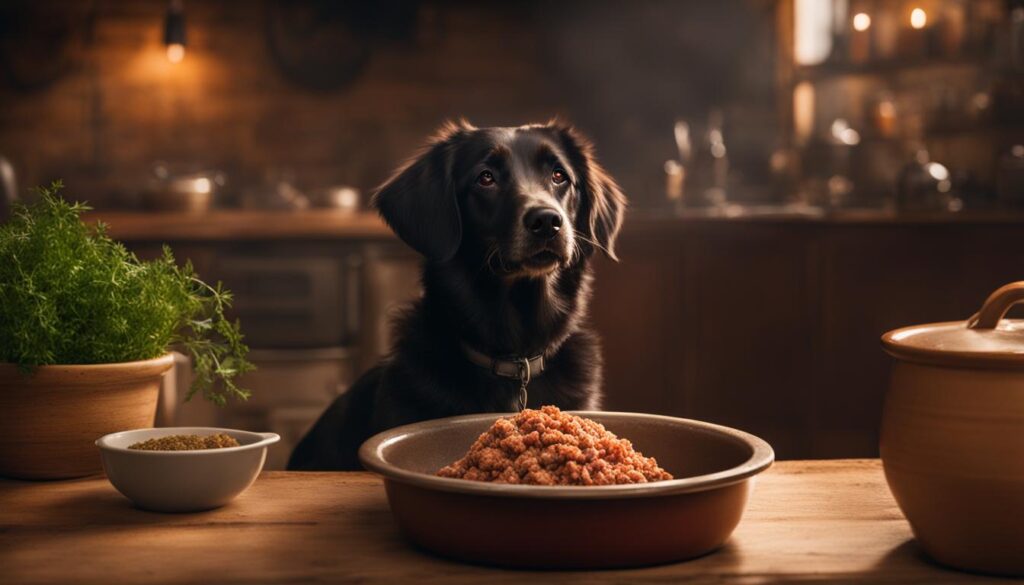
Turkey is a staple in many households, especially during holidays and special occasions. As dog owners, we may wonder if it’s safe to share this tasty protein-rich meat with our furry friends. The truth is, turkey is not inherently bad for dogs. In fact, it can be a healthy addition to their diet when prepared and served correctly.
When it comes to feeding dogs turkey, there are a few important factors to consider. Firstly, avoid adding ingredients or seasonings that may be harmful to dogs, such as garlic, onion, or excessive salt. Additionally, it’s crucial to ensure that the turkey is fully cooked to eliminate the risk of bacterial contamination.
Feeding dogs fatty parts of turkey should also be avoided. The high fat content can lead to digestive issues and potentially contribute to pancreatitis, a serious condition in dogs.
Furthermore, it’s crucial to remove all bones from the turkey before serving it to your dog. Cooked bones can splinter and cause choking hazards or damage to the gastrointestinal tract. To keep your canine companion safe, opt for boneless turkey meat.
When feeding turkey to your dog, moderation is key. It’s important to remember that turkey should not make up the majority of your dog’s diet. It should be offered as an occasional treat or as part of a balanced meal. Consult with your veterinarian to determine the appropriate portion size and feeding frequency based on your dog’s specific dietary requirements.
In summary, while turkey is not inherently bad for dogs, it’s crucial to follow certain guidelines to ensure your dog’s safety and well-being. Avoid fatty parts, ensure the meat is fully cooked, and remove all bones before serving. With proper precautions, turkey can be a tasty and nutritious addition to your dog’s diet.
The Benefits of Ground Turkey for Dogs
Ground turkey can offer several benefits for dogs. It is a lean source of protein, which is essential for building and repairing muscle tissue.
Protein is an important component of a dog’s diet, and ground turkey provides a high-quality protein source that is easily digestible for dogs. The amino acids in protein help support the growth and maintenance of healthy muscles, skin, and coat.
In addition to protein, ground turkey is also rich in essential nutrients that contribute to a dog’s overall health. It contains vitamins B6 and B12, which are crucial for proper nervous system function, and niacin, which aids in energy metabolism. Ground turkey is also a good source of minerals like zinc, selenium, sodium, phosphorus, choline, magnesium, and potassium, which are necessary for various bodily functions.
When considering ground turkey as dog food, it is important to note that it is low in fat compared to other meats, such as beef or pork. This makes it an ideal choice for dogs that may need to lose weight or maintain a healthy weight.
| Nutrient | Amount per 100g Ground Turkey |
|---|---|
| Protein | 19g |
| Vitamin B6 | 0.4mg |
| Vitamin B12 | 0.6μg |
| Niacin | 6.0mg |
| Zinc | 3.3mg |
| Selenium | 30.1μg |
| Sodium | 60mg |
| Phosphorus | 212mg |
| Choline | 94.9mg |
| Magnesium | 20mg |
| Potassium | 256mg |
Precautions When Feeding Ground Turkey to Dogs
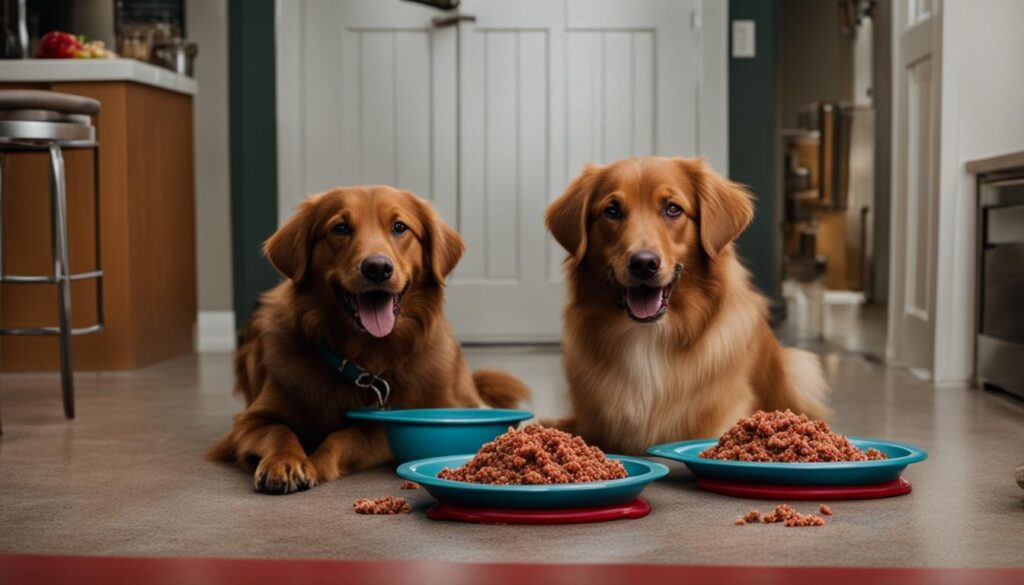
Feeding ground turkey to dogs can be a nutritious and delicious addition to their diet. However, it is crucial to take certain precautions to ensure their safety and well-being.
Cook the meat fully: When preparing ground turkey for dogs, it should be thoroughly cooked to eliminate any potential bacteria and minimize the risk of foodborne illnesses.
Avoid toxic ingredients: It is important to avoid adding extra ingredients or seasonings to the ground turkey that could be toxic to dogs. Stick to plain, unseasoned meat to ensure their health and prevent any adverse reactions.
Remove all bones: Before serving ground turkey to your canine companion, make sure to remove all bones from the meat. Bones can pose a choking hazard and may cause intestinal blockage, leading to serious complications for your dog.
Follow safe recipes and feeding guidelines: Utilize safe ground turkey recipes specifically designed for dogs. These recipes take into consideration the nutritional needs of dogs and ensure balanced meals. Pay attention to portion sizes and feeding guidelines to prevent overfeeding and ensure a healthy diet.
By following these precautions, you can enjoy feeding ground turkey to your furry friend, knowing that you are providing them with a safe and nutritious meal.
Ground Turkey Recipe for Dogs
Here is a simple ground turkey recipe for dogs that incorporates the precautions mentioned above:
| Ingredients | Instructions |
|---|---|
|
|
Remember to consult your veterinarian before introducing any new ingredients or recipes into your dog’s diet to ensure they meet their specific nutritional needs.
Can Dogs Eat Turkey Skin, Bones, and Fatty Parts?
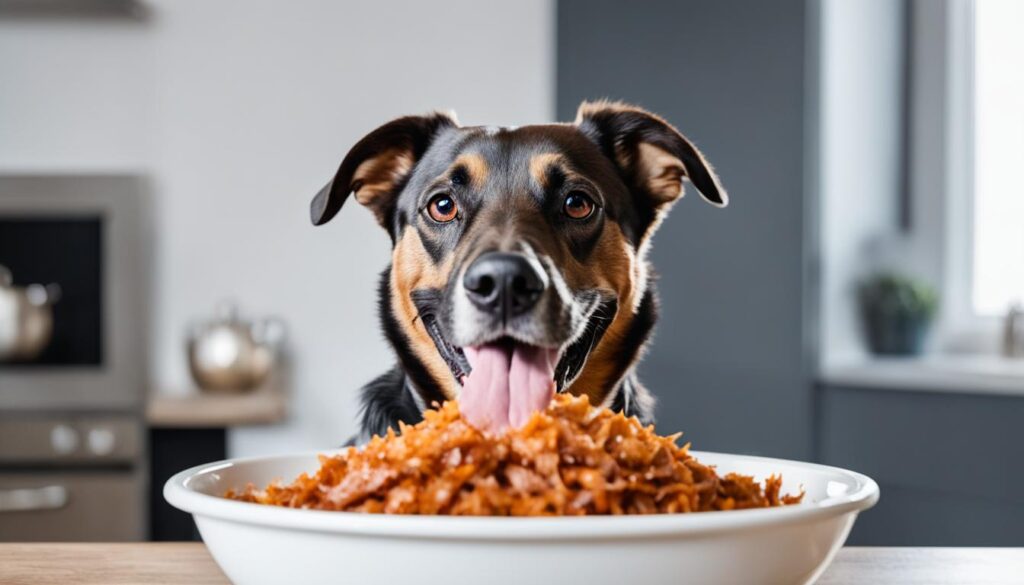
Dogs should not be given turkey skin, bones, or fatty parts. The skin of turkey is high in fat, which can lead to digestive issues in dogs if consumed. Additionally, cooked bones can splinter and pose a choking hazard or cause damage to the dog’s digestive system.
It is important to remove all skin, bones, and fatty parts from the turkey before feeding it to your dog. This will help ensure the safety and well-being of your furry friend.
Feeding turkey skin to dogs can result in gastrointestinal problems due to its high fat content. The excessive fat may cause diarrhea, vomiting, or even pancreatitis in some cases.
Similarly, turkey bones should never be given to dogs. Cooked bones can splinter easily, leading to severe injuries to the mouth, throat, or gastrointestinal tract. These injuries can be life-threatening and may require immediate medical attention.
Fatty parts of turkey, such as the skin and visible fat, should also be avoided. The high fat content can contribute to weight gain and obesity in dogs, leading to various health issues including joint problems and heart disease.
To ensure the safety and well-being of your dog, it is best to stick to lean, boneless, and skinless turkey meat when feeding them this protein-rich treat.
| Can Dogs Eat… | Yes/No |
|---|---|
| Turkey skin | No |
| Turkey bones | No |
| Fatty parts of turkey | No |
Allergic Reactions to Turkey in Dogs
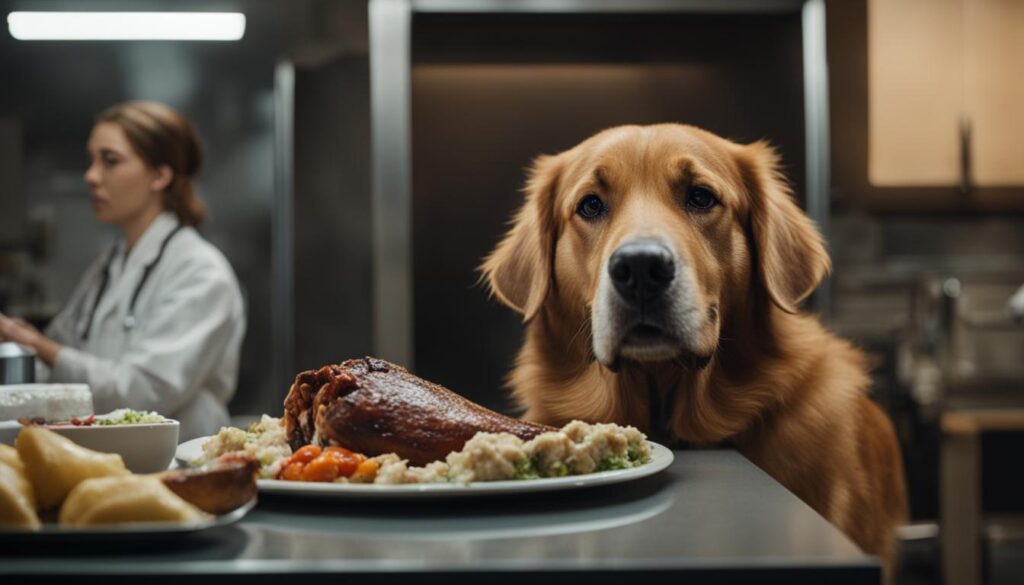
While turkey allergies in dogs are rare, it is possible for some dogs to develop allergic reactions to turkey over time. It’s important for pet owners to be aware of the symptoms and take necessary precautions to ensure their dog’s health and well-being.
Symptoms of a turkey allergy in dogs can vary, but commonly include:
- Itching and skin rashes
- Digestive issues such as vomiting or diarrhea
- Ear infections
- Respiratory problems such as coughing or sneezing
If you notice any of these symptoms after feeding your dog turkey, it’s advisable to consult with your veterinarian. They can provide a proper diagnosis and discuss the next steps to manage your dog’s allergy.
Alternative Protein Sources for Dogs with Turkey Allergies
If your dog is allergic to turkey, it’s necessary to find alternative protein sources to ensure they receive the necessary nutrients. Some suitable alternatives for dogs with turkey allergies include:
- Chicken: A lean protein source that is often well-tolerated by dogs
- Fish: Rich in omega-3 fatty acids and a great source of protein
- Beef: Another protein option that can be included in your dog’s diet
- Lamb: A good alternative for dogs with food sensitivities
It’s important to introduce any new protein source gradually and monitor your dog for any adverse reactions. Consulting with your veterinarian can help determine which alternative protein sources are suitable for your dog’s specific needs.
Turkey and Its Effect on Dogs’ Sleepiness

Many pet owners wonder if turkey makes dogs sleepy. While it is commonly believed that turkey contains high levels of tryptophan, an amino acid associated with drowsiness, the truth is that the amount found in turkey is not enough to cause significant sleepiness in dogs.
If you notice that your dog appears sleepy after eating turkey, it is more likely due to the contentment and relaxation they experience from a satisfying meal. It is important to remember that dogs have different metabolisms and reactions to food compared to humans. The effects of tryptophan on sleep are more pronounced in humans than in dogs.
However, it is essential to ensure that you are feeding your dog a balanced diet and not overfeeding them with processed meat or a high-fat diet. Overindulging in rich foods can lead to digestive discomfort and lethargy in dogs, making them appear sleepy. It is important to prioritize your dog’s overall health and well-being by maintaining a proper diet and portion control.
If you have concerns about your dog’s sleepiness or overall diet, consult with your veterinarian for personalized recommendations and guidance. They can help you determine the appropriate amount of turkey or any other food that should be included in your dog’s diet.
Myth: Turkey Makes Dogs Sleepy
“The belief that turkey makes dogs sleepy is a popular myth. While turkey does contain tryptophan, the amount found in turkey is not significant enough to induce sleepiness in dogs. If your dog appears tired after eating turkey, it is likely due to satisfaction and relaxation from a satisfying meal, rather than the effects of tryptophan.”
– Dr. Emily Jones, Veterinarian
| Myth | Facts |
|---|---|
| Turkey makes dogs sleepy. | The amount of tryptophan in turkey is not enough to cause significant sleepiness in dogs. If a dog appears sleepy after eating turkey, it is more likely due to contentment and relaxation from a satisfying meal. |
| Feeding dogs high-fat diets makes them more active. | Overfeeding dogs with processed meats or high-fat diets can lead to digestive discomfort and lethargy, making them appear sleepy. |
| Turkey has the same effect on all dogs. | Each dog’s metabolism and reactions to food are different. While some dogs may experience slight relaxation after eating turkey, others may show no noticeable change in behavior. |
Dark Meat vs. White Meat for Dogs
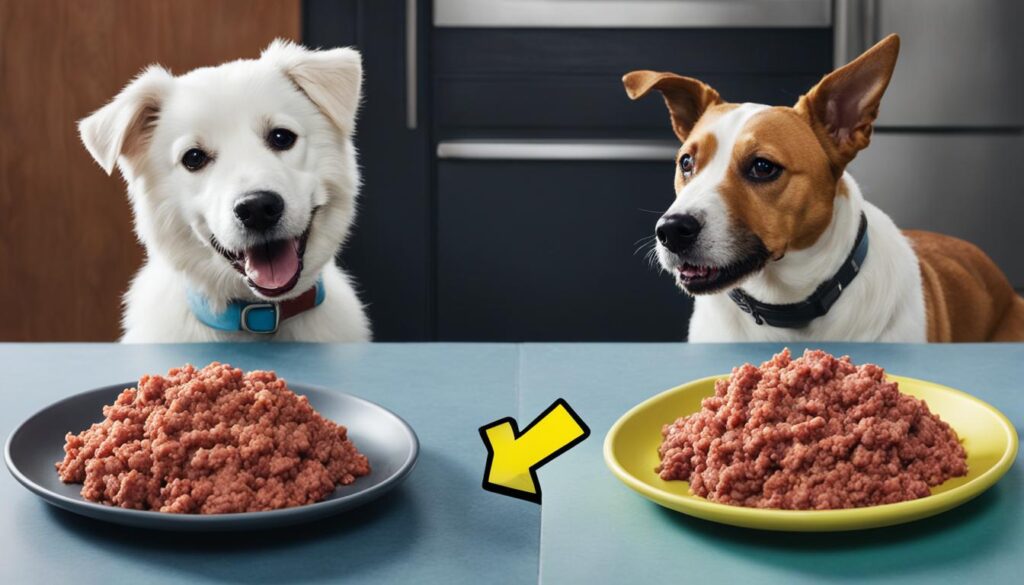
When it comes to feeding your dog turkey, choosing between dark meat and white meat requires careful consideration of their specific needs. Both options have distinct characteristics and nutritional profiles that can impact your furry friend’s health. Let’s explore the differences between dark and white meat, and determine which is better for dogs.
Dark Meat
Dark meat, found in the legs and thighs of the turkey, contains higher fat content and more calories compared to white meat. It is also rich in essential nutrients such as iron and zinc. However, excessive fat intake can lead to weight gain and digestive issues in dogs, so it’s important to remove the skin and excess fat before serving dark meat to your canine companion.
White Meat
White meat, often sourced from the breast of the turkey, is leaner and lower in fat compared to dark meat. It is an excellent source of high-quality protein and contains essential amino acids that support muscle growth and repair. Removing the skin and bones from white meat is crucial to ensure your dog’s safety and prevent any potential choking hazards.
Overall, the choice between dark and white meat depends on factors such as your dog’s calorie requirements and dietary needs. If your dog needs to lose weight or has a history of pancreatitis or gastrointestinal issues, white meat may be a more suitable option. However, if your dog requires a higher calorie intake or has specific nutrient deficiencies, such as iron or zinc, dark meat can be included in moderation. It’s always best to consult with your veterinarian for personalized dietary recommendations based on your dog’s overall health and specific nutritional requirements.
Remember, regardless of the type of meat you choose, it’s crucial to cook it thoroughly, free from added seasonings and ingredients that could be harmful to dogs. By taking these precautions and consulting with your veterinarian, you can ensure that your dog enjoys the benefits of turkey meat safely and healthily.
| Dark Meat | White Meat |
|---|---|
| Higher fat content | Lower fat content |
| More calories | Less calories |
| Rich in iron and zinc | Excellent source of protein |
How to Safely Feed Ground Turkey to Dogs
To ensure that your furry friend enjoys the benefits of ground turkey while staying safe and healthy, I recommend following these guidelines:
- Cook the meat thoroughly: It is crucial to eliminate any potential bacteria by cooking ground turkey thoroughly. Make sure it is fully cooked before serving it to your dog.
- Remove all bones: Before feeding ground turkey to your dog, carefully remove all bones from the meat. Bones can pose a choking hazard and may cause other serious health issues.
- Avoid adding seasonings or extra ingredients: While ground turkey alone is a great source of lean protein, it is important to avoid adding any seasonings or additional ingredients. Certain seasonings, such as onion or garlic, can be toxic to dogs.
- Serve in small portions: When introducing ground turkey to your dog’s diet, start with small portions. This will allow you to gauge how well your dog tolerates it and ensure a smooth transition without any digestive issues.
By following these guidelines, you can safely incorporate ground turkey into your dog’s diet and provide them with a nutritious and delicious protein source.
If you have any concerns or questions about feeding ground turkey to your dog, I highly recommend consulting with your veterinarian. They can provide personalized recommendations based on your dog’s specific needs and ensure that their diet remains balanced and healthy.
Expert Tip
“Remember, every dog is unique, and it’s important to monitor their response to ground turkey. If your dog experiences any digestive issues or allergies, consult your veterinarian immediately for guidance.”
Feeding ground turkey to your dog can be a rewarding experience, but it’s essential to prioritize their safety and well-being. By following the suggested guidelines and consulting with your vet, you can confidently add ground turkey to your dog’s diet and watch them enjoy its many benefits.
How Much Ground Turkey Can Dogs Eat?
The amount of ground turkey that dogs can eat depends on their size, age, and overall health. As a general guideline, turkey should make up no more than 10% of a dog’s daily caloric intake. Portion sizes vary, but a small dog can have 1-2 small pieces of turkey, while an extra-large dog can have a handful of turkey pieces. It is important to remember that the turkey should be cooked properly, boneless, and free from any harmful seasonings or additives before serving it to your dog.
Guidelines for Feeding Ground Turkey to Dogs
- Cook the ground turkey thoroughly to eliminate any potential bacterial contamination.
- Remove all bones to prevent choking hazards and intestinal blockage.
- Avoid adding any seasonings or ingredients that could be toxic to dogs, such as onions, garlic, or excessive salt.
- Feed ground turkey in small portions, especially if it’s the first time your dog is trying it, to ensure digestibility and prevent any potential stomach upset.
Remember, each dog is unique and may have different dietary needs. It is always recommended to consult with your veterinarian before making any changes to your dog’s diet. They can provide personalized feeding recommendations based on your dog’s specific nutritional requirements, health conditions, and any dietary restrictions.
| Dog Size | Portion Size |
|---|---|
| Small | 1-2 small pieces of turkey |
| Medium | 2-3 small pieces of turkey |
| Large | A few larger pieces of turkey |
| Extra-Large | A handful of turkey pieces |
Wrapping Up
In conclusion, feeding ground turkey to dogs can be a beneficial and nutritious choice. Ground turkey is a lean protein source that provides essential nutrients such as vitamins B6 and B12, niacin, zinc, and selenium. Including ground turkey in a dog’s diet can help meet their nutritional needs and promote overall health.
However, it is crucial to follow safe feeding practices when giving ground turkey to dogs. Ensure that the meat is fully cooked to eliminate any potential bacteria and choking hazards. Avoid adding harmful ingredients or seasonings that can be toxic to dogs. Removing all bones from the meat is imperative to prevent choking or intestinal blockage.
Consulting your veterinarian for personalized dietary recommendations is essential. They can provide guidance on portion sizes, feeding frequency, and any specific dietary requirements your dog may have. By following these precautions and seeking professional advice, you can safely incorporate ground turkey into your dog’s diet and offer them a tasty and nutritious treat.
Remember, the health and well-being of your canine companion should always be a top priority. Providing a balanced and varied diet, combined with regular exercise and veterinary care, will help ensure a happy and healthy life for your beloved pet.
FAQ
Is ground turkey good for dogs?
Ground turkey can be a healthy addition to a dog’s diet when prepared and served correctly. It is a lean protein source that provides essential nutrients for dogs.
Is turkey bad for dogs?
Turkey is not inherently bad for dogs. However, it can become unhealthy and potentially unsafe when prepared with added ingredients, seasonings, or cooked with the skin and bones.
What are the benefits of ground turkey for dogs?
Ground turkey is a lean source of protein that provides important nutrients like vitamins B6 and B12, niacin, zinc, selenium, sodium, phosphorus, choline, magnesium, and potassium. It can help meet a dog’s nutritional needs and promote overall health.
What precautions should I take when feeding ground turkey to dogs?
When feeding ground turkey to dogs, it is important to cook the meat fully, remove all bones, avoid adding seasonings or extra ingredients, and serve it in small portions. Follow safe recipes and feeding guidelines to ensure the safety and well-being of your dog.
Can dogs eat turkey skin, bones, and fatty parts?
Dogs should not be given turkey skin, bones, or fatty parts. The skin is high in fat and can cause digestive issues, cooked bones can splinter and pose a choking hazard or damage the dog’s digestive system.
Can dogs be allergic to turkey?
While turkey allergies in dogs are rare, some dogs may develop allergic reactions to turkey over time. If you suspect a food allergy to turkey, consult your veterinarian to discuss next steps and determine suitable alternative protein sources for your dog.
Does turkey make dogs sleepy?
Although turkey contains tryptophan, which is associated with drowsiness, the amount found in turkey is not enough to cause significant sleepiness in dogs. If a dog appears sleepy after eating turkey, it is more likely due to general contentment and relaxation from a satisfying meal.
What is better for dogs, dark meat or white meat turkey?
When choosing between dark meat and white meat for dogs, consider factors such as calorie intake and dietary needs. Dark meat is higher in fat and calories, while white meat is leaner and lower in fat. Consult your veterinarian for personalized dietary recommendations.
How to safely feed ground turkey to dogs?
To safely feed ground turkey to dogs, cook the meat thoroughly to eliminate bacteria, remove all bones, avoid adding seasonings or extra ingredients, and serve it in small portions. Consult your veterinarian for specific feeding recommendations.
How much ground turkey can dogs eat?
The amount of ground turkey that dogs can eat depends on their size, age, and overall health. As a general guideline, turkey should make up no more than 10% of a dog’s daily caloric intake. Always consult your veterinarian for personalized feeding recommendations.
Can I use ground turkey as dog food?
Ground turkey can be a healthy and nutritious addition to a dog’s diet when prepared and served correctly. It provides essential nutrients and lean protein for dogs.


